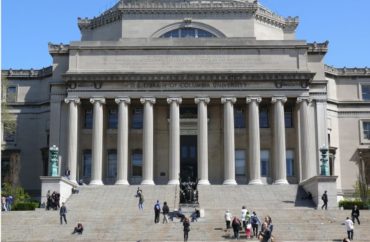
Columbia Republicans face ‘significantly more bureaucratic hurdles’: club president
Columbia University placed last out of 203 universities scored by the Foundation for Individual Rights and Expression and College Pulse in their 2022-23 “College Free Speech Rankings.”
The university received the only “abysmal” rating for “Speech Climate,” scoring just 9.91 points out of a possible 100.
“Any time I have a conservative view on a social or political topic, I feel that I can not candidly convey that view because of the sensitivity of leftists,” according to an anonymous Class of 2024 student quoted in the survey data. “For the record, I consider myself a moderate/independent,” the student wrote.
The student had responded to the survey prompt, “Please share a moment where you personally felt you could not express your opinion on your campus.”
The leader of the campus Republican club said her group is no stranger to attacks on free speech.
“Every semester our posters are torn down and conservative students are harassed in classrooms for expressing right-of-center views,” Columbia College Republicans president Lucy Collins wrote in a statement emailed to The Fix.
Administrators put a “special event” label on one College Republicans’ event, Collins told The Fix, which means the group is “not able to host a speaker until the 6th week of school, to allow time for event reviews and other administrative hurdles.”
A Cato Institute researcher who has spoken at the university said the speech restrictions have not affected him pesonally.
Constitutional scholar Roger Pilon, a Columbia College Republicans guest speaker who also gave a commencement address for the School of General Studies, told The Fix in a September 20 email that “on none of those occasions were there any problems with organization or at the events.”
The College Fix reached out to College Democrats on campus and asked if it agreed with the findings or if there was a political bent to the suppression of speech, but the group did not respond.
The Fix asked Columbia officials if they had any plans to address the report and increase viewpoint diversity on campus.
Survey included nearly 45,000 students
FIRE, a nonpartisan advocacy group for free expression, collaborated with the data analytics firm College Pulse to gather and analyze data from 44,847 students, including nearly 250 Columbia students. Each student answered 31 survey questions relating to experiences with and attitudes towards freedom of expression on their campus.
Survey questions included asking students whether their school should allow certain speakers promoting controversial ideas on topics such as abortion, Black Lives Matter and illegal immigration. The survey also evaluated student comfortability and confidence in discussing politics and controversial topics in the classroom.
Schools gained points based on seven components relating to freedom of expression on campus: openness to the discussion of challenging topics, tolerance for both liberal and conservative speakers, administrative support for free speech, student comfort expressing ideas, and acceptance of controversial behavior towards guest speakers.
“27% of students say they are not worried about damaging their reputation because someone misunderstands something they have said or done,” FIRE’s reported.
Additionally, “for every one conservative student, there are roughly 6.8 liberal students,” according to the highlights.
The rankings incorporated measurements of school administrative behavior along four dimensions: supported/sanctioned scholars from 2019-2022, successful dis-invitations from 2019-2022, and the FIRE Speech Code Rating (the official ”written policies governing student speech,” according to FIRE).
Columbia’s poor performance this year is primarily due to this year’s addition of school administrative behavior, according to FIRE Senior Research Fellow Sean Stevens.
“A total of 14(!) scholars were sanctioned [for speech issues] from 2019 up to July 1 of this year” at Columbia, Yale and Georgetown, Stevens wrote in a September 23 email to The College Fix.
“Administrators could reform their campus speech policies to better protect free expression,” Stevens stated. “If they do this publicly and also stand up for the speech rights of students and faculty during campus controversies, instead of punishing them, school’s should see their score and ranking improve.”
FIRE’s commentary on the report highlighted pervasive self-censorship across all universities surveyed, with “63% of respondents worrying about damaging their reputation because someone misunderstood something they said or did.” Additionally, “40% of students” in all universities surveyed “are uncomfortable disagreeing with a professor — in public or in a written assignment.”
MORE: Columbia University cancels from event doctor who inflated COVID credentials
IMAGE: Ad Meskens/Wikimedia Commons
Like The College Fix on Facebook / Follow us on Twitter






Please join the conversation about our stories on Facebook, Twitter, Instagram, Reddit, MeWe, Rumble, Gab, Minds and Gettr.